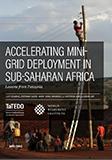Publications
Modern energy access is an important determinant of human health, as it plays a critical role in the capabilities of healthcare facilities and aids in the development of clean and safe household environments. But in the developing world, thousands of healthcare facilities and hundreds of millions of households lack access to modern energy services. And the situation will only get worse as the energy needs of communities and the health sectors in these countries are expected to increase dramatically in the years ahead. This special feature begins with a look at energy access and health implications, along with energy access and reliability gaps, at two levels: electrification of healthcare facilities and household energy. It then tackles the barriers to better energy access and reliability, and concludes with opportunities and options—including decentralized renewable energy, hybrid solar PV/diesel, grid extension, energy-efficient medical equipment, a greater availability of clean energy sources and technologies (such as cleaner cook stoves and fuels).
The paper finds that addressing this unmet need in an efficient and timely matter will require decision-makers to better incorporate health considerations into energy policy, and vice-versa. The UN’s 17 Sustainable Development Goals (SDGs) provide an opportunity to apply a nexus approach to energy and health—building on various linkages that energy and health have with sustainable development (including SDG 5 on gender equality, SDG 11 on sustainable urban environments, and SDG 13 on climate action).
Porcaro, Jem; Mehta, Sumi; Shupler, Matthew; Kissel, Sarah; Pfeiffer, Michaela; Dora, Carlos Francisco C.; Adair-Rohani, Heather. 2017. Modern Energy Access and Health. State of Electricity Reports. Washington, D.C.: World Bank Group. http://documents.worldbank.org/curated/en/756131494939083421/Modern-energy-access-and-health


